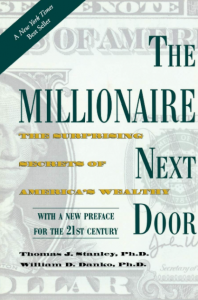There’s a handful of people I went to high school with that grew up with “money“.
Old money that is.
These individuals have had wealth trickling down their family tree for generations.
Two of them have families that when added together, own over 65% of the town I live in (Monroe, Louisiana).
This inherited money is typically termed old money whereas recently earned or acquired money is known as new money.
But there’s much more to it than that.
These labels not only describe where someone’s wealth came from but also their spending habits.
Let’s take a deeper look into what each of these groups are all about…
Don’t Miss Any Updates. Each week I’ll send you advice on how to reach financial independence with passive income from real estate.
Sign up for my newsletterWhat Is Old Money?
Proverbs 13:22: “A good man leaves an inheritance to his children’s children.”
Families described as “old money” have had wealth passed down and sustained over many generations.
Typically an old money family have a higher social standing and belong to the upper class.
Their family name is often synonymous with wealth and prestige such as the Rockefellers and Vanderbilts.
How Many Generations Are Considered Old Money?
Even though old money is inherited wealth; it doesn’t necessarily mean that all inherited money is old wealth.

Let me explain.
Most social scientists state wealth must be sustained through more than three generations before being considered “old money”.
I don’t know about you, but if I inherited $70 billion, I wouldn’t care what you called me! 🙂
What Is New Money?
If old money is considered acquiring wealth passed down via generations before them, then new money is used to describe those who earned their wealth.
These individuals are also known as “first generation millionaires” such as:
- pro athletes
- entrepreneurs,
- musicians
- prominent CEOs
When you think about people in this category, think of:
- Steve Jobs
- Bill Gates
- Jeff Bezos
- Mark Zuckerberg
All of the above are entrepreneurs that earned a lot of money through innovation and creating large corporations.
Many of the professional athletes that leave college or high school that come from nothing are also considered new money individuals.
Unfortunately, sometimes this “new found wealth” causes them to buy expensive cars, boats and houses that sometimes leads to bankruptcy.
New Money vs Old Money: Key Differences
As previously discussed, the main difference between new money vs old money is the source of the person’s wealth.
But there are other things that can distinguish wealthy families from one another such as:
- social position
- spending habits
- social perception
Source of wealth
The easiest way to differentiate new money from old money is where it came from.
Wealth that has been passed down through generations is considered old money while newly earned wealth is new money.
In the United States, many of the U.S. old money families are descendants of early industrialists.
Here’s a few examples of old money families:
- Henry Ford
-
John Jacob Astor
- J.P. Morgan
-
John D. Rockefeller
- Andrew Carnegie
New money can often be found in celebrities, sport stars and entrepreneurs.
Social standing and social perception
The perception of the old vs new money class is very different.
Many old money individuals are elitists from the NE part of the U.S. They’re able to live in high society areas such as the Hamptons and Martha’s Vineyard because of their inherited money.
They’re viewed as educated, refined, respectable and wealthy. Typically they make efforts to avoid the spotlight unless it involves something to help grow their wealth.
For instance, Paris Hilton has been known to smartly use the media to help build her brand in the past.
On the other hand, many times new money people have a rags to riches story and may have grown up poor or even came from middle-class families. .
Even though a family with new money might be just as wealthy as a family with old money, they still might not be considered as “upper-class” as a family with old money.
Spending habits
One of the biggest differences between new money vs old money has to do with their spending habits and lifestyle.
Families with old money tend to be more on the frugal side. They understand that their wealth has been passed down from previous generations and technically it isn’t their money.
And it’s up to them to keep this trend going.
This group of people remind me of those portrayed in the book, “The Millionaire Next Door” which describes how the typical millionaire in the United States lives, which isn’t all that flashy.
That’s not to say that families with old money don’t spend on luxury items.
It’s understandable that they live in high-priced homes, drive nice cars, and purchase luxury clothing.
But they tend to spend more practically and view large purchases as investments rather than splurges.
On the other hand, new money families haven’t had this access to generational wealth. They’re much more inclined to consider the money theirs to live on versus theirs to pass down to future generations.
As you can imagine, this group is more likely to be involved with more frivolous spending, including expensive homes, extravagant designer clothes and flashy cars.
This is why many times you’ll see pro athletes such as Mike Tyson lose millions over a short period of time.
Spending money for new money folks is primarily about an experience while old money sees money primarily as a means of investment, even if the purchased item is for personal use.
New Money vs Old Money: Which Is Better?
Now that you understand the difference between new money vs old money, which do you think is better?
If you’re someone that was born into poverty and busted your butt by outworking everyone to build wealth and obtain success then you wouldn’t have any issue with having this “new money” label.
As a matter of fact, most people would be more than happy to have new money when you consider that 10% of Americans own 70% of the overall wealth while millions more spend their entire lives living in poverty.
Some of those born into old money may look down on those that obtain new wealth.
It all boils down to how you were raised to think about money.
If you were someone that was taught that money is a tool and should be used to help those in need, then you may not have any issue when it comes to new money vs old.
On the other hand, if you were raised in a snobby family that avoided associating with lower class people then you might have a more negative view of new money.
I believe that it really doesn’t matter how you’ve obtained your wealth as long as you treat others equally.
My parents are hard working blue collar people that gave my brother and I all that we needed. We never wanted for anything and were happy and content during our childhood.
For me, money is nothing more than a tool and what you do with it to improve your life and the lives of others is the only thing that really matters.
Join the Passive Investors CircleFinal Thoughts
Studies show that roughly 70% of the wealthiest people are self-made and fall into the new money category. This leaves around 30% that have inherited their wealth.
So it goes with saying that more than likely you’ll fall into the new money category.
By learning the similarities and differences of each group; you’ll be able to learn how to live life and make plans for wealth.





